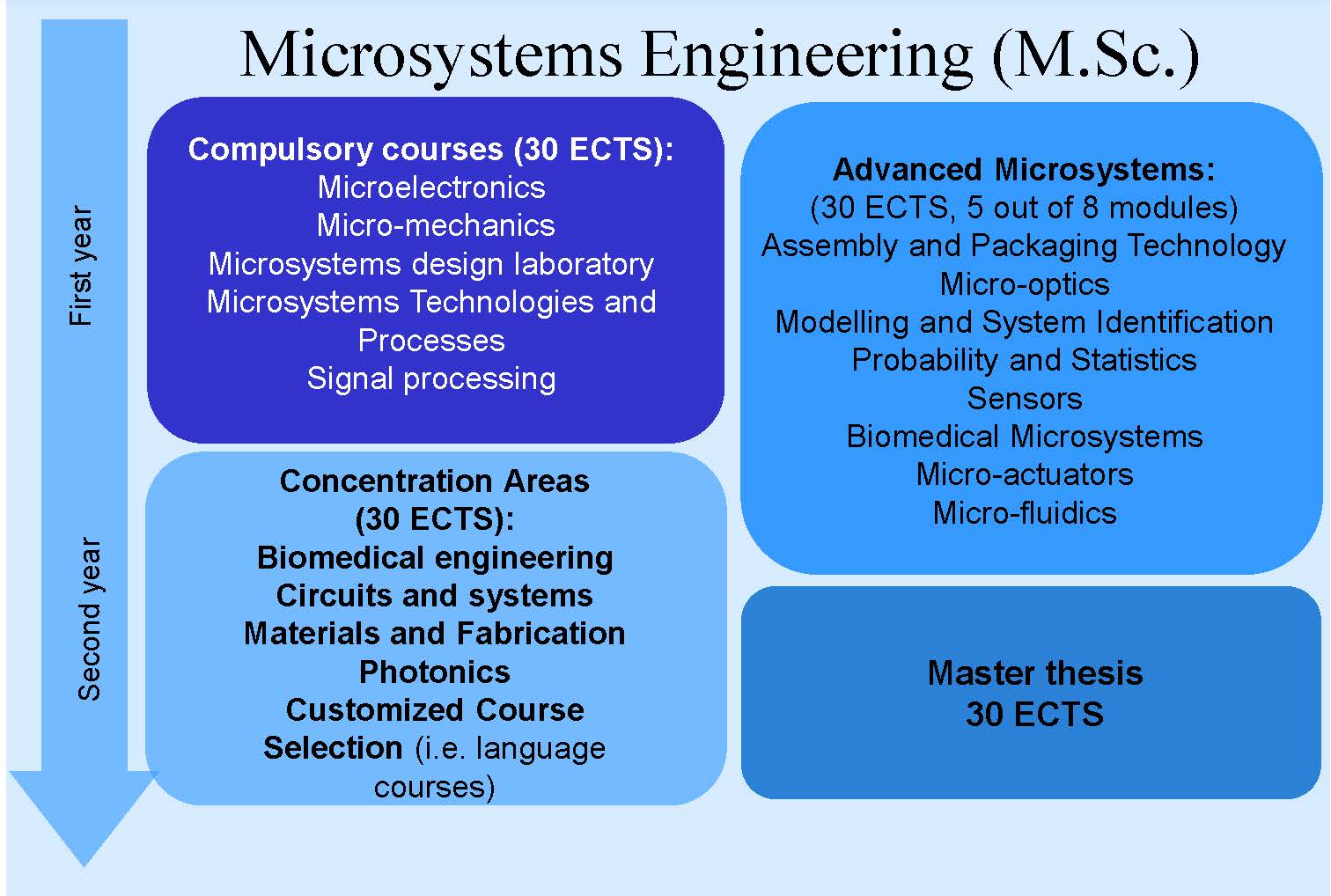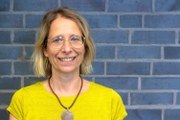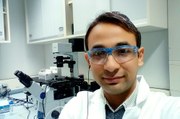Microsystems Engineering (en) (Master of Science)
Interdisciplinary work and research
Microsystems engineering is the engineering discipline with the broadest focus: elements from mathematics, physics, chemistry, electrical engineering and materials science form the cornerstones of exciting innovations.
Microsystems engineering- a versatile technology that industries can no longer do without
The products we deal with on a daily basis are becoming ever smaller, more powerful, smarter, more connected and more independent. Often, however, the sensors and systems that are in these everyday objects are so miniaturized that they are nearly invisible. That is precisely the reason they have taken a foothold in most industries.
A lot of the products and systems within such sectors as the automobile industry, medical services, communications and energy are unimaginable today without microsystems engineering, making your career as a microsystems engineer a versatile and exciting choice!
Your benefits as a Microsystems Engineering student:
- Study at one of the world’s largest and leading academic research centers in the field of microsystems engineering
- With around 440 students and 22 professors, we offer an excellent student-teacher ratio for optimal supervisory support.
- State-of-the-art equipment with a designated clean room: Here you will become familiar with working in this special laboratory environment.
The English taught Master's degree program in Microsystems Engineering has been designed for German and international graduates holding a bachelor's degree in electronics, mechatronics, (bio-)medical engineering or any other related engineering discipline.
Prerequisites
- Bachelor's degree in mechatronics, electrical, electronics, or mechanical engineering, or in a closely related study field, previous knowledge in mathematics, chemistry, physics, electronics, electrical and mechanical engineering and materials
- English language proficiency level C1 (to find out which language certificates are accepted, please go to Application / English language proficiency).
Facts and Figures
| Scope: | 120 ECTS credit points |
| Standard program duration: | 4 semesters = 2 years |
| Language of instruction: | English |
|
Intakes: |
winter semester (October) |
Fees and cost
German and EU nationals
Altogether 190 € per semester to be paid to the university. |
Non-EU nationals
Altogether 1690 € per semester to be paid to the university. |
| The living cost in Freiburg amounts to approximately 900-1000 € per month. | |
Application
| Application: |
Applications will be done electronically. Please register in the online application portal, enter your data and upload the following documents:
Undergraduate diploma and transcript of records: If you have completed your studies, but not yet received the bachelors diploma, the transcript of records has to show the total number of credit points, final grade and the remark "degree conferred" or "degree awarded". If not, please submit an additional confirmation letter from the university stating the total number of credit points, the final grade and that the degree has been conferred. English language proficiency: Please note: Incomplete applications will not be considered. Certificates issued in a language other than German or English must be accompanied with a translation by an authorized translator. The online application is not always intuitive. If you are unsure, follow the instructions for the online application. |
|
Admissions:
|
The admissions committee will verify whether you fulfill the special prerequisites specified in the admissions regulations. For further information please contact the program coordinator (see contact persons). |
|
Application deadlines: |
Applications for the winter semester 2026 will begin on March 1, 2026. May 1 (early bird): You would like to be informed about the result of your application by the end of May? Then apply before May 1! |
| Faculty affiliation: | Faculty of Engineering |
Curriculum
This is an overview over the curriculum of Microsystems Engineering:

During the first year, the five mandatory courses Micro-electronics, Micro-mechanics, Microsystems Technologies and Processes, Microsystems Design Lab I as well as Signal Processing provide the fundamental framework for a future career in microsystems and equip students with a broad knowledge base in the most important aspects of the field. In addition, the students will choose five out of eight courses offered in the Advanced Microsystems area.
| First semester |
|
| Second semester |
|
In the 2nd, 3rd and 4th semester, MSE students will complete several courses in their chosen concentration area, thus allowing each student to realize their individual interests and obtain an in-depth look at a sub-discipline of this very broad, interdisciplinary field. The following concentration areas are offered:
- Circuits and Systems
- Biomedical Engineering
- Materials and Fabrication
- Photonics
Essential for the successful completion of the Master’s degree is the submission of a Master’s thesis, which is based on a project performed during the fourth semester of the program. During this time, each student works as a member of one of the 20 research groups of the department, with full access to laboratory and cleanroom infrastructure. If the Master's thesis topic is chosen from the same area that a student chose as their concentration area, it will be mentioned as a specialization in the degree certificate.
Please click here for a tabular representation of the curriculum.
Possible occupational fields
Graduates of the Master's program in Microsystems Engineering can either apply for a PhD position or work as an engineer in a company. Potential employers are for example companies working in fields including electronics as well as mechanical, automotive, or biomedical engineering.
Syllabus and Examination Regulations
Please note: Only the latest versions are listed here. Older versions can be found in Module Handbooks and Exam Regulations under Studies and Teaching.
- Online version of the module handbook in HISinOne (Please note, loading might take some time)
- Detailed PDF version of the module handbook (as of April 2024)
(Please note: the PDF version is updated only once per semester) - The official Exam and admission regulations (in German) are available on the web pages of the Legal Department.
Students who started their studies before WS 2021/22 can find the respective information under Module Handbooks and Exam Regulations under Studies and Teaching - Exam regulations (unofficial version in English - not binding)
Check out our dates and deadlines for course registration or exam registration.
Contact Persons
Do you have any questions concerning the application and admission procedure? Please contact:
 |
Ms. Ursula Epe Georges-Köhler-Allee 101 |
For questions about the examination regulations, module handbooks, curricula and non-subject-related courses, please contact the program co-ordinator:
|
|
Ms. Svenja AndresenGeorges-Köhler-Allee 106 |
- Open telephone consulting hours: Tuesday 9:30 to 11:30 a.m. and Thursday 9:30 to 11:30 a.m. (Exceptions and deviations will be announced here)
- Personal consultation (via video conference or in person on selected days) by appointment only
For questions pertaining to the curriculum, please contact the academic advisors:
 |
Dr. Jochen KieningerGeorges-Köhler-Allee 103 |
 |
Dr. Oswald Prucker |
Testimonial
 "The MSE programme is a comprehensive programme covering every aspect of MEMS. Highly equipped laboratories and cleanroom facilities are among the distinct facets of this course. Lectures are challenging, and relate directly to ongoing research activities at IMTEK. The most admirable thing about this course is its diversity and freedom of selecting concentration subjects, regardless of your previous study background."
"The MSE programme is a comprehensive programme covering every aspect of MEMS. Highly equipped laboratories and cleanroom facilities are among the distinct facets of this course. Lectures are challenging, and relate directly to ongoing research activities at IMTEK. The most admirable thing about this course is its diversity and freedom of selecting concentration subjects, regardless of your previous study background."
Dr. Yawar Abbas
Particularities about this study program
Practical Cleanroom Experience
Cleanrooms are crucial for the design and production of microsystems, since the presence of even one tiny dust particle can destroy such a system. Cleanrooms are expensive to maintain and working in such a lab requires special skills. All of our Master students will participate in a cleanroom lab and may use the cleanroom during their Master thesis project (if necessary), thereby also acquiring important skills needed for working in a researcher or in a company.
A Mentor for each Student
Each professor is in charge of a number of students whom s/he mentors. These mentors help you to organize your studies and are ready to answer your questions about studying abroad, finding a job, and more.
Certification of English Medium Instruction Competencies
The instructors of the MSc. program have been certified for instruction in English.
Smart, Micro, Green
Smart – stands for robots that act independently, for computers that learn to interpret images or algorithms that become faster and smarter. Simply put, smart stands for computer science.
Micro – is meant literally here. The tiniest technical systems emerge that inconspicuously take on complex tasks in everyday life, medicine and industry. Without even knowing it, you are constantly dealing with microsystems. They make our lives healthier, safer, more comfortable, more versatile and, to say the least, easier.
Green – Freiburg is known worldwide for being the Green City. Since 2015, the Faculty of Engineering has been active from an engineering perspective with its own department for sustainability research. How can renewable energy be generated, fed into the grid and stored? How do we develop materials and systems that are produced and used in an energy- and resource-efficient way and that can adapt optimally to difficult environmental conditions or disasters?
Studying engineering in Freiburg always means that you benefit from all three areas of research, no matter which area you choose. Smart, micro and green technologies are becoming more and more in demand - acquire the necessary competencies to solve the social and technical questions of the future as engineers and computer scientists!


